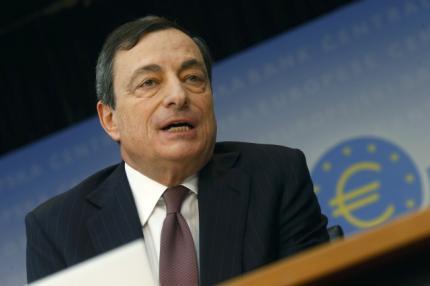Europe shares extend rally on M&A, ECB policy talk
Bareksa • 07 Apr 2014

European Central Bank President Mario Draghi attends the monthly ECB news conference in Frankfurt (REUTERS/Ralph Orlowski)
U.S. payrolls reassure on economic growth rate
Reuters - European stocks rose on Friday, boosted by M&A fever in construction, speculation about further stimulus by the European Central Bank and U.S. jobs data that suggested a solid pace of hiring for a second month in a row.
Shares in Lafarge surged 8.9 percent and Holcim rose 6.9 percent as the world's two largest cement makers said they are in merger talks. A deal could be Europe's biggest tie-up of the year to date creating a company with a stock market value of over $50 billion.
"On a geographical and industrial point of view, a merger would be meaningful," Natixis analyst Abdelkader Benchiha said. "Lafarge is strong is Africa and Middle East, where Holcim is almost absent. On the other hand, Holcim has a strong presence in Latin America, where Lafarge is not established."
Spanish and Italian shares also featured among the top gainers. Their advance accelerated during a late euro-zone rally sparked by a report that the European Central Bank has modelled the economic effects of buying 1 trillion euros ($1.37 trillion) of securities as part of a quantitative easing (QE) programme.
The Frankfurter Allgemeine Zeitung reported the ECB had estimated that buying 1 trillion euros of assets over a year would add 0.2 or 0.8 percentage points to inflation, depending on the economic models used.
"The question would be whether the private debt market in Europe is big enough for QE," the newspaper quoted someone whom it described as a central bank insider as saying.
The FTSEurofirst 300 index of top European shares ended 0.6 percent higher at 1,352.78 points, gaining ground for the ninth session in a row and hitting its highest level in 5 1/2 years.
European stocks have rallied sharply in the past three weeks, partly on expectations the ECB will act to counter low inflation and partly on easing tensions between Russia and the West over Ukraine.
"We know that there's a push from Germany to make sure the ECB does something," said Michel Juvet, chief investment officer at Swiss bank Bordier. Juvet added that a quantitative easing programme could be the right step to take, provided the authorities made sure the money went to companies, rather than being used to make banks buy up sovereign bonds.
Stocks also got a boost from the closely watched U.S. non-farm payrolls. It showed the United States added 192,000 jobs last month, just shy of the 200,000 forecast, after adding 197,000 in February. The unemployment rate remained 6.7 percent.
"It's mostly the positive revision for February that's a good surprise. It removes doubts about the pace of U.S. growth," said Alexandre Baradez, chief market analyst at IG France.
"But all this has been priced in already by the market, and with Wall Street trading at record highs without clear positive catalysts ahead, stocks may soon be ripe for a correction. If there's a pull-back in New York, Europe won't be immune."
After a positive open, U.S. stocks slipped on Friday, with the Nasdaq losing more than 2 percent, losing steam following recent hefty gains.